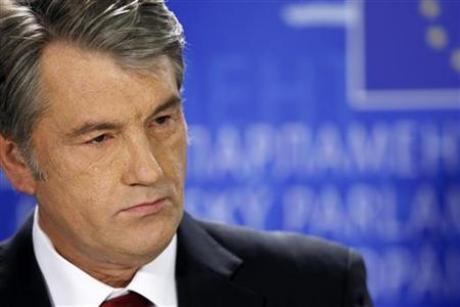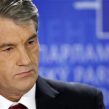
Will Yushchenko Help Yanukovych in Election Campaign?
Publication: Eurasia Daily Monitor Volume: 7 Issue: 3
By:

A former employee of President Viktor Yushchenko’s secretariat has claimed that Yushchenko agreed to back the frontrunner, Party of Regions leader Viktor Yanukovych in the run-up to the January 17 presidential election. Both Yushchenko and Yanukovych denied this, but Prime Minister Yulia Tymoshenko, against whom the accord is allegedly directed, said she believes in its existence. Yushchenko who is running for re-election does not miss an opportunity to blame Tymoshenko for almost everything that goes wrong in Ukraine, from pervasive corruption to the economic crisis. He says he does this so that he, rather than Tymoshenko, will reach the run-off scheduled for February 7, to face Yanukovych there. Either Yushchenko has lost touch with reality, as polls show he stands no chance of reaching the run-off stage, or he is really helping Yanukovych.
On December 25, Yaroslav Kozachok announced his resignation as deputy head of the presidential secretariat’s department for regional policy. He said this was in protest against a secret agreement reached between Yushchenko and Yanukovych in order to beat Tymoshenko in the election. He claimed that rapprochement between Yushchenko and Yanukovych, who was defeated by Yushchenko in a highly controversial presidential election in 2004, started in late 2005. Kozachok said that as a person who “believes in democratic values” he could not stand it any longer.
According to the text of the agreement offered to the media by Kozachok, Yushchenko pledged not to criticize Yanukovych during the election campaign and back him in the run-off. In exchange, Yanukovych agreed to nominate Yushchenko for prime minister to replace Tymoshenko after the election. Also, Yanukovych would renege on his promise to voters to make Russian the second official language, as well as keeping the current head of the security service (SBU) and the regional governors and cabinet ministers who belong to Yushchenko’s party. Moreover, the parties of Yanukovych and Yushchenko allegedly agreed to set up a new majority coalition in parliament without Tymoshenko’s party (https://ura-inform.com/politics/2009/12/25/oni/). If this happened, Tymoshenko would be left in the opposition and a snap parliamentary election, which both Yanukovych and Yushchenko wanted to hold after the presidential election, would be avoided.
Both Yushchenko and Yanukovych dismissed the document publicized by Kozachok as a “provocation.” Yushchenko instructed prosecutors to check Kozachok’s allegations. He alleged that Tymoshenko was behind them. Yushchenko said he would never serve as prime minister under President Yanukovych. At the same time, Yushchenko admitted that he does not criticize Yanukovych at the current stage of the campaign. “I criticize Tymoshenko now, but when I am in the run-off I will criticize Yanukovych,” he said (Ukrainsky Pohlyad, December 25).
Yushchenko and Tymoshenko share the same national-minded conservative electorate concentrated in West Ukraine, and therefore it would be logical for Yushchenko to spoil Tymoshenko’s campaign by any means if he stood a chance of beating her. However, opinion polls show that Yushchenko stands no chance. The most recent polls conducted in December by FOM-Ukraine and Democratic Initiatives showed that no more than 3.5-3.7 percent of Ukrainians are ready to vote for Yushchenko while popular support for Tymoshenko is above 15 percent and support for Yanukovych is around 30 percent. Yushchenko is only the fifth or sixth most popular candidate among 18 running (Ukrainska Pravda, December 28, 29).
Yushchenko has never trusted opinion polls too much and he apparently believes in his own messianic role in Ukraine, consequently he may still think he can beat Tymoshenko. However, by building his campaign solely on criticizing Tymoshenko and her cabinet, Yushchenko objectively helps Yanukovych. Many people in Ukraine will trust Kozachok after hearing what Yushchenko said about Tymoshenko.
For example, speaking on a regional television program in West Ukraine recently, he blamed Tymoshenko for parliament’s failure to pass the state budget for 2010. This is only partially true as Tymoshenko’s coalition does not control a majority in parliament, so her budget bill should be easily blocked by the opposition. He accused Tymoshenko of ruining the post-Orange Revolution democratic coalition in 2005 by her corruption allegations against his party members. He added that one out of every five members of Tymoshenko’s caucus in parliament is an oligarch, hence the pervasive corruption in Ukraine (Interfax-Ukraine, December 27). In fact, there are many rich businessmen who reportedly abuse their government connections to promote their business interests also present in the teams of both Yanukovych and Yushchenko.
Yushchenko is especially keen on attacking Tymoshenko’s weakest point: her income declaration. Speaking in Tymoshenko’s native city of Dnipropetrovsk, Yushchenko said that she does not want to declare her true income (UNIAN, December 25). According to Tymoshenko’s declaration she has no property, no bank account, and even no car. When asked about her sources of income, she vaguely refers to her husband’s agricultural business, but refuses to provide any detail. At a recent press conference, she refused to speak about her home rent (Ukrainska Pravda, December 29). As is widely known, Tymoshenko was considered Ukraine’s richest woman in the mid-1990’s when she ran the United Energy Systems, a gas intermediary.




